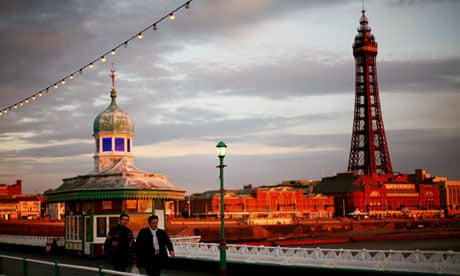Bloomfield is the unhealthiest district in England's unhealthiest town, Blackpool. More than half of the local population smokes, the highest rate in the country. One in three pregnant women, even up to the point they go into hospital to give birth, are still smoking. Alcoholism is rife, while deaths from drug abuse rival those of the worst estates in London or Glasgow.
Sitting in his office in Bloomfield, Blackpool's director of public health, Dr Arif Rajpura, offers no miracle cures. More pills won't treat Blackpool's malaise when the diagnosis is poverty. Just up the road from his office is the local football stadium, home to Blackpool FC, whose sponsor is emblematic of the town's economic hardship: payday lender Wonga. "It's just wrong," says Rajpura, whose battle plan to improve health in Blackpool is about fighting the flood of bedsits, illicit cheap cigarettes, all-night drinking, and streets given over to the payday lenders and betting shops.
In Bloomfield alone there is an off-licence for every 250 people, each trying to undercut the other. In the town centre, all-night drinking is legendary, with some clubs not closing their doors until 7am. Rajpura backs the council's plan to impose a 3am curfew, using an "early morning restriction order", in the face of bitter opposition from publicans. "We have got to try to bring closing times back to 3am, although I'd like to see it at 2am. We see so many incidents that happen after 3am, with people pouring into A&E at 9am or even 10am," he says.
Catastrophic levels of liver cirrhosis and digestive problems in Blackpool alone account for up to one year of the town's five-year longevity gap with the rest of England. Another whole year is put down to violence, self-harm, overdose and poisoning.
Much of the violence is a result of heavy drinking, Rajpura says, who wants to see minimum prices for alcohol. But that is a battle on the national stage, and one that has been lost. "We were extremely disappointed. It would have had a massive positive impact."
Poor housing is also at the crux of Blackpool's poor health. Defunct guesthouses have been bought up by landlords to profit from housing benefit claimants piled into "HMOs" – houses of multiple occupation.
"We have 3,000 HMOs in Blackpool, which bring in a lot of people on incapacity benefit with attendant social and healthcare problems. Blackpool is a net importer of ill-health, with people coming into bedsits which are a great income for landlords, who can convert a three-storey terrace into eight bedsits. They make £80 on each one, which is £640 a week or more than £33,000 a year."
In a population of 140,000, Blackpool has a "churn" of about 7,500 a year. Many who leave each year are the better off, while the 7,500 who come in are often the poor from the rest of the north-west and are heading straight into the HMOs. "To improve Blackpool's health figures, first of all we need to sort out housing and the supply of HMOs," Rajpura says.
One solution is to cut the levels of housing benefit. Blackpool says it is the "polar opposite" to parts of the country such as London, where housing benefit may be insufficient. In Blackpool it is too much, and produces perverse outcomes.
In a submission to the House of Commons communities and local government committtee, the borough council said: "The artificially high levels of local housing allowance mean that it is far more financially advantageous for property owners to rent to housing benefit claimants than to improve their homes to enable sales to owner-occupiers. The demand from housing benefit claimants is effectively unlimited because of continuing in-migration of people on benefits from other parts of the country."
Does Rajpura despair of Blackpool ever recovering? Not at all. Smoking during pregnancy is "truly shocking", he says, but it has fallen from a high of 40%. Although life expectancy at 73.8 years for males is the worst in England, it is up from 72 in 2003. "We are winning the battle. But there's an awful long way to go," he says.




Comments (…)
Sign in or create your Guardian account to join the discussion